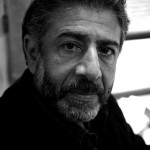During her final days, which we sort of knew would be her final days, since cancer rarely pulls a prank, and the eyes of farewell often don’t postpone what they want to say today for tomorrow, my mother, watching me prepare my suitcase for the departure I came from and to which I’d return, said in supplication: May God light your way. In what I heard I instantly saw the Verse of Light, written in complicated Kufic script, hanging on the wall: “God is the Light of Heavens and Earth, the parable of His Light is as if there were a Niche and within it a Lamp, the Lamp enclosed in Glass, the Glass as if it were a brilliant star lit up by a blessed Tree, an Olive neither of the East nor of the West, whose Oil is Luminous, without being touched by flame: Light upon Light…”.
In which darkness did my mother see my way so that she would spend a few more of the precious words she had remaining in her account? What did her eyes that gleamed with the glow of extinguished silver see as she was peering into the afterlife?
It was daylight.
The sun had granted creatures amplified shadows.
An old saluki dog sat panting under a eucalyptus tree.
Pebbles were incandescent in a dry riverbed.
It was no ordinary light that which my mother wished to illuminate my path. It wasn’t Edison’s light bulb, or fluorescent, luminescent light, or the light of projectors at football stadiums, or that of the space shuttle’s orbiter. It wasn’t Shakespeare’s pendulum in no man’s land, between light and lightness. It wasn’t even the Pharisee torch that Christ set aside. My mother meant Noor. Although she was likely ignorant of the argument that still rages on in Arabic about the difference between the two lights, Noor and Dao (and the extended irony in transliteration of the latter).
Astronomers, obsessed with their observatories and mathematics, say there is no scientific difference between Noor and Dao, that they are no more than poetic wordplay. But Sufis claim a difference that observatories can’t detect and math can’t comprehend. God, the Light of Heaven and Earth, doesn’t need to resort to a game of words and meaning to resemble poetry. Yet even so, there is no harm if Noor is poetry and Dao is prose, since the latter has numerous sources, and dances according to supply and demand. The former, however, like poetry, is rare. If and when it is revealed to one, that person will survive many an unseen darkness. And the veil may even be lifted, and one becomes a saint.
Years passed since my mother’s death. I no longer resemble my Bedouin ancestors and look to the stars during my stays and travels. For all I know, only batteries and electric companies have lit my way.
It’s clear, for reasons I can guess, that God did not fulfill my mother’s prayer.
All this came to mind while I was trying, unsuccessfully, to write a poem about a greenish light, lime luminosity, limelight, citric light that leaves no shadow of outstretched hand or body walking in its domain.
Is remembering my mother a pretext to write about Noor/Dao, or is writing about them a pretext to remember my mother?
Dao will be the last thing humans see.
The origin
is the dark.
Behind his shut lids
a child sees dao.
The first thing wasn’t a scream.
When we turn off dao
the jet-black night isn’t faraway.
In a flash it returns.
Under a green moon-dao
I extend my hand.
A willow branch shakes.
Stars and planets
aren’t lanterns for our sake.
They have other tasks.
The Yemeni Sirius
is in his constellation.
An abandoned God.
Without dao there is no color.
Black and white
are a division of labor.
Dao and shadow are side by side
as long as we remain
earth-bound.
Purity.
Before this visual contamination.
Your face.
Noor
is essence it is
also form.
The humility
of noor’s essence turns it
into form.
When you are in the land of noor
take off your footwear
walk barefoot as you were born.
Noor is a laughing face.
A hand waving from a distance.
Memory of mother.

Amjad Nasser was born in Jordan in 1955. He is a leading figure in Arabic letters. His works have been translated into several languages. He has published nine poetry collections, four lyric travel memoirs, and two novels. Petra is his chapbook poetry collection available from Tavern Books. He has worked in journalism throughout his career.

Fady Joudah received the Yale Series for Younger Poets prize, the Griffin International Poetry prize, and a Guggenheim Fellowship, among other honors for his poetry and translation.



